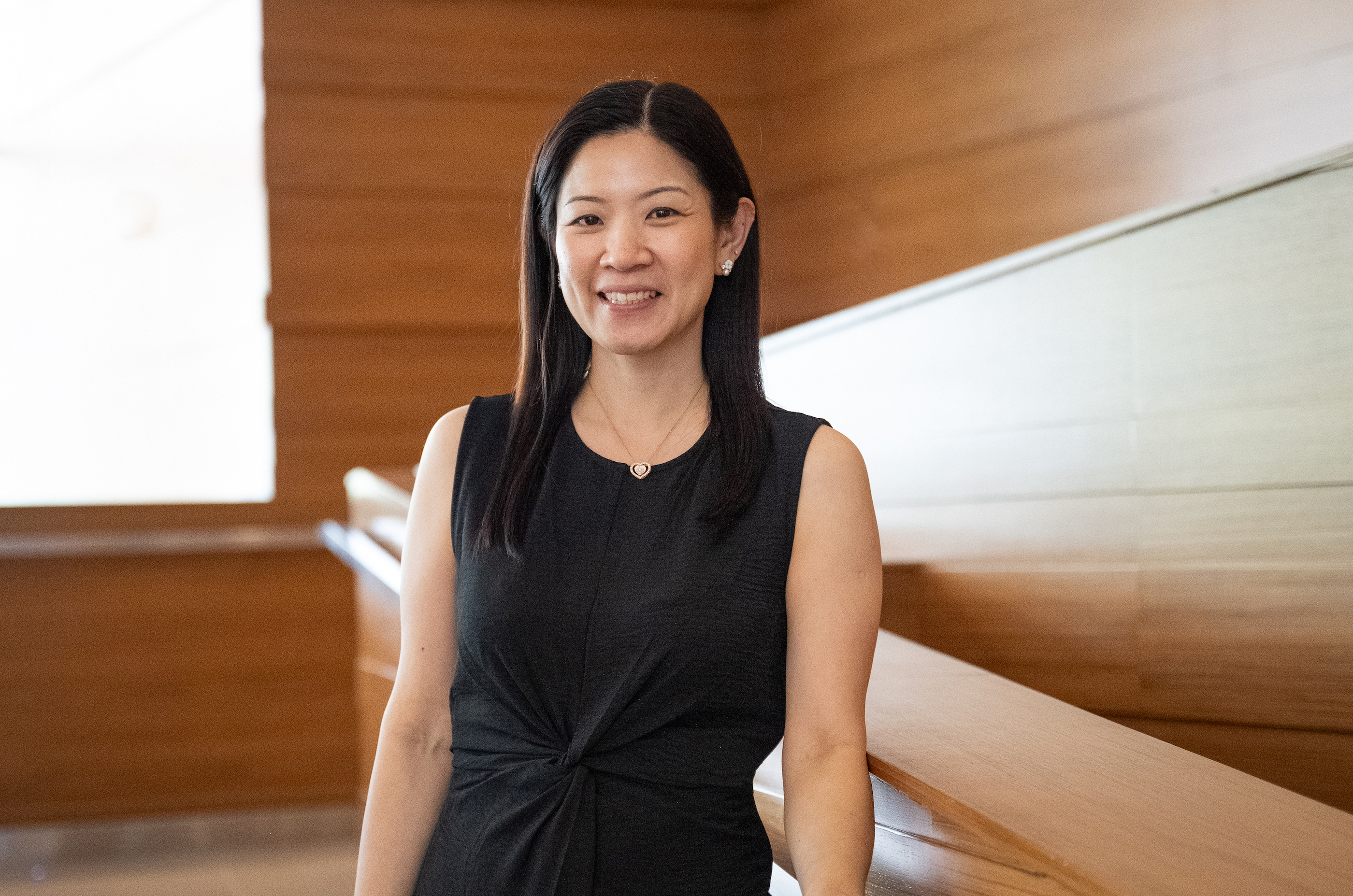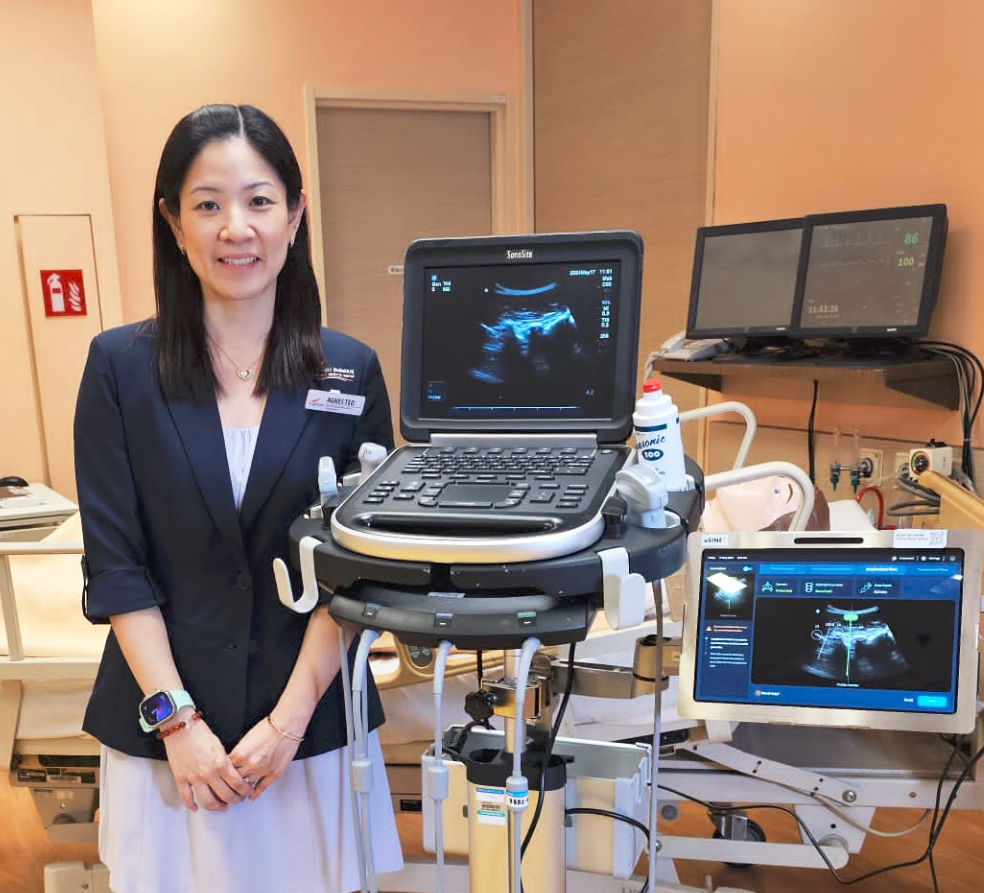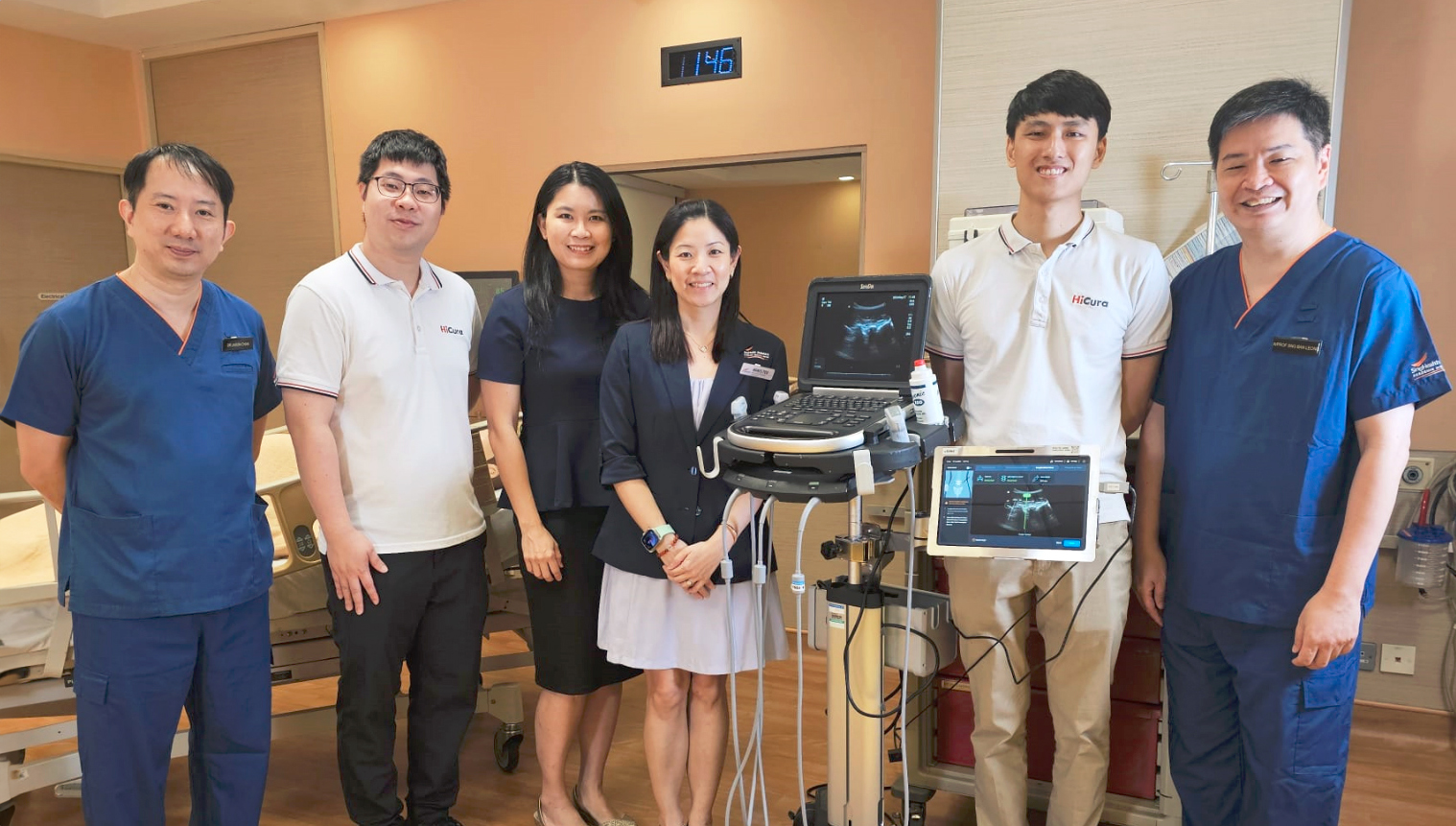Bringing the latest health technologies into local healthcare settings to benefit more women
An experienced Clinical Research Coordinator (CRC), Agnes Teo, Senior Clinical Research Coordinator (CRC) has been serving in the Department of Women’s Anaesthesia at KK Women's and Children’s Hospital (KKH) for 14 years. Prior to that, she was a CRC in the KK Research Centre for three years.

Agnes Teo, a CRC of 17 years
She has led numerous clinical trials and introduced medtech innovations into clinical practice, such as the world’s first artificial intelligence-powered ultrasound guided automated spinal landmark identification system, uSINE®.
Spinal anaesthesia is widely used for pain relief for women in labour. However, identifying the precise site for needle insertion is a manual process, and higher accuracy is required. To minimise pain and complications for patients, uSINE® was developed to help doctors to better deliver spinal anaesthesia at the first attempt.
A mother of two herself, Agnes marvels at the potential of harnessing technology to elevate patient care, especially in critical moments during childbirth.
“My passion for clinical research has been a driving force throughout my career. It is fulfilling to be actively involved in research studies that translate to a direct and positive impact for patients, such as safer or less anxious deliveries for women during childbirth,” she shared.
Introducing new technologies into clinical practice to elevate patient care during childbirth
The journey from developing an innovative idea into a product which can be commercialised and adopted into clinical practice requires determination and patience to problem-solve and find solutions at each step of the way.
Agnes shared that introducing uSINE® into clinical practice took three years. As lead CRC, Agnes supported the lead Principal Investigator (PI) in the project, where the team conducted a clinical study that evaluated the safety and efficacy of uSINE® to be adopted into clinical workflow and practice.

Agnes with the uSINE® system
Agnes played a crucial role in managing the intricacies of study operations and administration. She worked closely with the software developers of uSINE®, conducted user testing with clinicians, and prepared training materials as the software and device underwent multiple versions based on user-experience feedback.
When the team encountered challenges in recruiting prospective mothers, largely due to hesitancy stemming from concerns about their baby's safety, Agnes drew on her personal experience to allay their fears.
“As most mothers are concerned about the potential side effects, I will first introduce myself to my patients and go through the study with them thoroughly. Sharing my experience of having received spinal anaesthesia the traditional way; it helps them understand the difference and benefits of using uSINE®,” she said.
In addition to patient recruitment, there was the challenge of encouraging clinicians who were accustomed to the manual method of identifying where to place the spinal needle in the patient’s lumbar spine, to become more willing to adopt uSINE®.
Determined to showcase the benefits of the technology, Agnes and her team conducted numerous user tests, gathered diverse feedback from healthcare professionals, and worked closely with software developers to improve user experience. Their efforts eventually received positive responses from doctors, who found the software user-friendly and greatly beneficial.

Some of the KKH staff and HiCura Medical team members behind uSINE® (From L to R): Dr Jason Chan, KKH, Mr Alex Goh and Dr Ng Cailin, HiCura Medical, Ms Agnes Teo, KKH, Mr Joshua Chen, HiCura Medical and A/Prof Sng Ban Leong, KKH.
The system was licensed to HiCura Medical for commercialisation.
It was a fulfilling moment when the team’s hard work contributed uSINE® securing the approval from the Health Sciences Authority for use in Singapore.
uSINE® was implemented in KKH in May 2023. The success rate for achieving spinal anaesthesia at the first attempt were revealed in clinical trials:
-
Women with high body mass index (>30kg/m2): 43% to 82% in obese women.
-
Women with normal body mass index (<30kg/m2): 70% to 92%
Comforting mothers through music
Another memorable project Agnes recalled over her career, was being part of a team to develop a music-based intervention programme, 'Healing Tunes', and witness its integration into clinical practice at KKH.
'Healing Tunes', the first such programme in Singapore, aims to reduce anxiety and minimise pain magnification for women undergoing elective C-sections. Using a mobile device, patients could select and listen to their preferred tunes before, during and after surgery,” she shared.
'Healing Tunes' is backed by evidence. In a comprehensive study involving 108 women undergoing elective C-sections, those who underwent the programme experienced a significant 50% reduction in their anxiety scores, and their pain magnification scores decreased by 35%.
Reflecting on her journey in contributing towards safer childbirth experiences for mothers
Driven by a passion to bring medtech innovations and new technologies into clinical practice, Agnes shared that such successful new methodologies would contribute to safer and less anxious child delivery experiences for mothers in future.
There were many complexities in obtaining regulatory approvals for new technologies which involves not only understanding the technical aspects of the devices but also effectively managing the safety and maintenance processes. Despite the challenges, Agnes persevered, motivated by the dedication of her team.
Agnes attributes her relentless passion and perseverance to her team of CRCs, clinicians, and senior research fellows, some of whom she been colleagues with Agnes since she started working in the department.
“They are like my second family,” Agnes said with conviction. Together, this team continues to strive at improving the maternity care experience for mothers in Singapore.
Outside of work, Agnes prioritises spending quality time with her children through outdoor activities and sing-along sessions.
“As much as childbirth and parenthood is a learning journey that can be exhausting at times, at the end of the day, it is worth it when we as mothers are able to watch our children grow up,” she shared. Agnes finds joy in her daughter’s love for performing which she finds adorable and whose antics makes her laugh. On weary days, significant moments such as these reminds her of her calling to do her job well and ensure that the patients and mothers-to-be feel safe, heard and cared for — a full circle moment for her.
Agnes finds a unique sense of achievement when her children excitedly spot her work in news reports. Looking ahead, Agnes continues to lead new trials that will improve the patient’s experience, ranging from antenatal to postnatal care.


